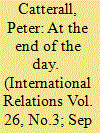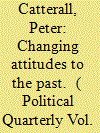| Srl | Item |
| 1 |
ID:
117427


|
|
|
|
|
| Publication |
2012.
|
| Summary/Abstract |
Pre-publicity for the final volume of Harold Macmillan's memoirs, At the End of the Day, stressed that it would provide the British side of the Cuban missile crisis for the first time. The Churchillian model chosen, changes required by the Cabinet Office and Macmillan's desire to rebuke those political opponents who claimed that the crisis demonstrated a lack of British influence in Washington, however ensured a focus on his personal relationship with President Kennedy. His larding the text with contemporary observations from his diaries also skewed Macmillan's account and, in particular, underplayed the significance of British moves at the United Nations in New York to secure a credible United Nations inspection regime and a US guarantee of the inviolability of Cuba. Careful reconstruction of Macmillan's real-time experience of the Cuban missile crisis demonstrates the limitations of his own account of this event.
|
|
|
|
|
|
|
|
|
|
|
|
|
|
|
|
| 2 |
ID:
156781


|
|
|
|
|
| Summary/Abstract |
What societies choose to remember about the Past can pose challenges for professional gatekeepers in museums, archives and statutory bodies charged with managing national heritage. Recent examples examined in this article include the inauguration of the National Museum of African American History and Culture in Washington, the 2016 Capability Brown Festival, changing attitudes towards poppies and the Rhodes Must Fall movement. These are explored through establishing a taxonomy of the eight functions that lieux de mémoire fulfil in the course of reflecting the Past to the Present. Drawing attention to the way in which the imperialism of the Past is buried beneath the pristine lawns of Capability Brown's gardens in the Present, this article concludes by warning that lieux de mémoire can provide an aesthetic veneer, glossing over aspects of the Past that societies, or elites within those societies, would, for their own purposes, rather forget.
|
|
|
|
|
|
|
|
|
|
|
|
|
|
|
|